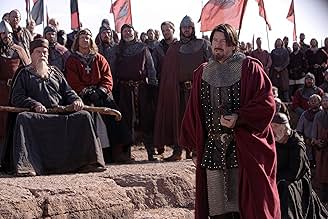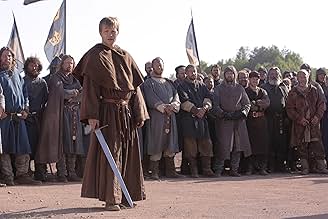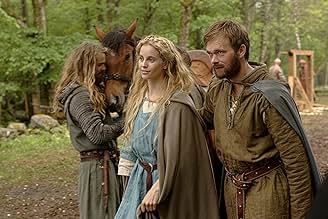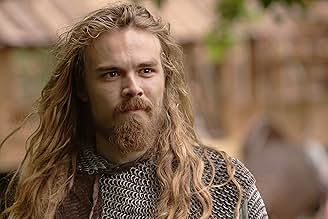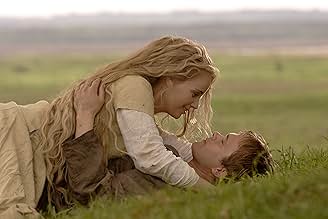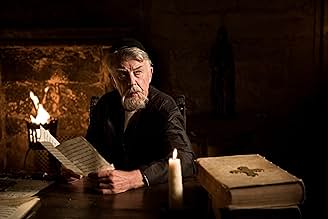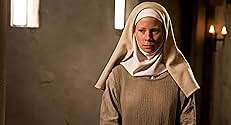NOTE IMDb
7,3/10
2,9 k
MA NOTE
Ajouter une intrigue dans votre langueArn must endure a great ordeal before he can get the love of his life Cecile, who has been confined to a monastery.Arn must endure a great ordeal before he can get the love of his life Cecile, who has been confined to a monastery.Arn must endure a great ordeal before he can get the love of his life Cecile, who has been confined to a monastery.
- Récompenses
- 1 nomination au total
Parcourir les épisodes
Histoire
Le saviez-vous
- AnecdotesThis movie stars four Skarsgårds: Stellan Skarsgård and three of his sons--Gustaf, Bill, and Valter.
- GaffesIn the era in which this series takes place, Swedes, Norwegians, and Danes still spoke the same language, albeit with distinct accents.
- ConnexionsEdited from Arn, chevalier du temple (2007)
Commentaire à la une
As a young boy I wanted to see more knights on TV, but the only time you ever saw them was when one of the classic Hollywood films dealing with the middle ages came on. Occasionally someone would pay homage to the medieval genre, but little else. In the 90s I thought of doing a short film, but I had no access to props. Come 2005, and my hopes are re-sparked to do a short film, but six years later, with my reputation hopelessly smashed, and finances all but ruined, I'll have to bow to someone else.
And so they did. Only the country wasn't the US nor the UK, but Sweden of all places. The one country known for symbolic avant garde cinema, brings us a mainstream historical epic, completely with charges and clashing of armies in both the frozen north and in the heated wastes of the arid Holy Land.
Arn, raised by priests and monks, is challenged with events beyond his control, and that put him in the midst of a cultural clash he'd just assume forget. His beloved is likewise castigated as socially unacceptable, and also suffers a similar emotional fate.
This is a hard story about hard times in human history. It's almost a template of how true human love could not endure nor blossom at this point in history. And, true to Scandinavian form, there is much angst and weighty emotional stuff pervading the film.
There are two real problems with this "TV Series". The first is that it's shot like a feature film all the way through. Each shot is given care and weight as if the entire thing were going to be shown in one sitting. Second; this, along with the fact that it's a history piece, probably sent the budget skyrocketing (at least by the standards of European film interests) creating sets and costumes, as well as purchasing and renting animals and locations to bring not only medieval Sweden to life, but also Jersalem during the middle ages.
So, was it worth it? Well, you'd have to ask the investors who backed this project. You probably also know that Ridley Scott's "Kingdom of Heaven" came out before this film was released, but, from all accounts, it would seem the Swedish film was planned long before then, yet had trouble getting off the ground.
The story is solid, as are the production values, but the film lacks majesty and genuine intimacy. The length of the series seems to be an attempt to make up for that, but quantity can only substitute for so much quality. With all of the sets, costumes, panoramic vistas, throngs of medieval peasants and warriors alike of both sides of the Christian cross and Islamic crescent, there's a lack of genuine intimacy.
Arn and Cecile may be in love, but their chemistry is about as reactionary as a vat of water molecules and carbon. It ain't there. At least not genuinely. One doesn't get the sense that Arn longs for Cecile, nor Cecile for Arn. In the entire expanse of six hours plus of drama, what we're left with is a satisfying sense of emptiness, topped with a sense of marginal disappointment.
The one thing that it has over Scott's "Kingdom of Heaven" is that there is a sense of purpose there. There is a sense of something that's driving the story forward and needing to be done. Arn needs to get back to Cecile. But, beyond that, the film is essentially a budgeted and elongated version of Scott's film, even though "Kingdom of Heaven" was most likely conceived as the market competitor to Sweden's film.
An enjoyable watch all the same, if somewhat lengthy. See it once.
And so they did. Only the country wasn't the US nor the UK, but Sweden of all places. The one country known for symbolic avant garde cinema, brings us a mainstream historical epic, completely with charges and clashing of armies in both the frozen north and in the heated wastes of the arid Holy Land.
Arn, raised by priests and monks, is challenged with events beyond his control, and that put him in the midst of a cultural clash he'd just assume forget. His beloved is likewise castigated as socially unacceptable, and also suffers a similar emotional fate.
This is a hard story about hard times in human history. It's almost a template of how true human love could not endure nor blossom at this point in history. And, true to Scandinavian form, there is much angst and weighty emotional stuff pervading the film.
There are two real problems with this "TV Series". The first is that it's shot like a feature film all the way through. Each shot is given care and weight as if the entire thing were going to be shown in one sitting. Second; this, along with the fact that it's a history piece, probably sent the budget skyrocketing (at least by the standards of European film interests) creating sets and costumes, as well as purchasing and renting animals and locations to bring not only medieval Sweden to life, but also Jersalem during the middle ages.
So, was it worth it? Well, you'd have to ask the investors who backed this project. You probably also know that Ridley Scott's "Kingdom of Heaven" came out before this film was released, but, from all accounts, it would seem the Swedish film was planned long before then, yet had trouble getting off the ground.
The story is solid, as are the production values, but the film lacks majesty and genuine intimacy. The length of the series seems to be an attempt to make up for that, but quantity can only substitute for so much quality. With all of the sets, costumes, panoramic vistas, throngs of medieval peasants and warriors alike of both sides of the Christian cross and Islamic crescent, there's a lack of genuine intimacy.
Arn and Cecile may be in love, but their chemistry is about as reactionary as a vat of water molecules and carbon. It ain't there. At least not genuinely. One doesn't get the sense that Arn longs for Cecile, nor Cecile for Arn. In the entire expanse of six hours plus of drama, what we're left with is a satisfying sense of emptiness, topped with a sense of marginal disappointment.
The one thing that it has over Scott's "Kingdom of Heaven" is that there is a sense of purpose there. There is a sense of something that's driving the story forward and needing to be done. Arn needs to get back to Cecile. But, beyond that, the film is essentially a budgeted and elongated version of Scott's film, even though "Kingdom of Heaven" was most likely conceived as the market competitor to Sweden's film.
An enjoyable watch all the same, if somewhat lengthy. See it once.
Meilleurs choix
Connectez-vous pour évaluer et suivre la liste de favoris afin de recevoir des recommandations personnalisées
- How many seasons does Arn have?Alimenté par Alexa
Détails
- Date de sortie
- Pays d’origine
- Site officiel
- Langue
- Aussi connu sous le nom de
- Arn: The Knight Templar
- Sociétés de production
- Voir plus de crédits d'entreprise sur IMDbPro
Contribuer à cette page
Suggérer une modification ou ajouter du contenu manquant


